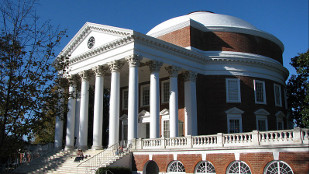 University of Virginia, Wikimedia, terren in VirginiaA federal court awarded Weihua Huang, a former University of Virginia geneticist, more than $800,000 last week after a jury found that the university wrongfully fired him for telling officials that his supervisor, Ming Li, had surreptitiously changed the budget for Huang’s grant—inappropriately increasing the amount of funding—provided by the National Institutes of Health.
University of Virginia, Wikimedia, terren in VirginiaA federal court awarded Weihua Huang, a former University of Virginia geneticist, more than $800,000 last week after a jury found that the university wrongfully fired him for telling officials that his supervisor, Ming Li, had surreptitiously changed the budget for Huang’s grant—inappropriately increasing the amount of funding—provided by the National Institutes of Health.
“This decision is important to the entire grant community because, on these grants, levels of efforts are assigned and the principal investigator is responsible for the use of the money,” Adam Carter, Huang's attorney, told the Richmond-Times Dispatch. “That is the person who needs to be responsible and, in this case, that responsibility was taken over by the lab director.”
As a principle investigator, Huang applied for and received a NIH grant of $378,750 in 2008 to study the genetics of nicotine addiction. According to the suit, Huang had originally budgeted 50 percent of his time to the project and 5 percent of Li’s time, but later realized that Li had changed the budget without consulting him—bumping Huang’s commitment to 75 percent, Li’s to 7.5 ...




















